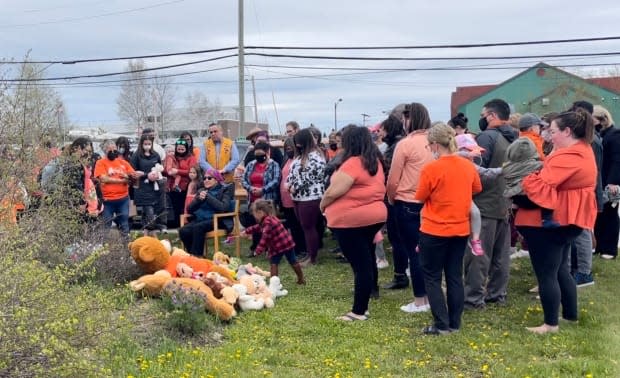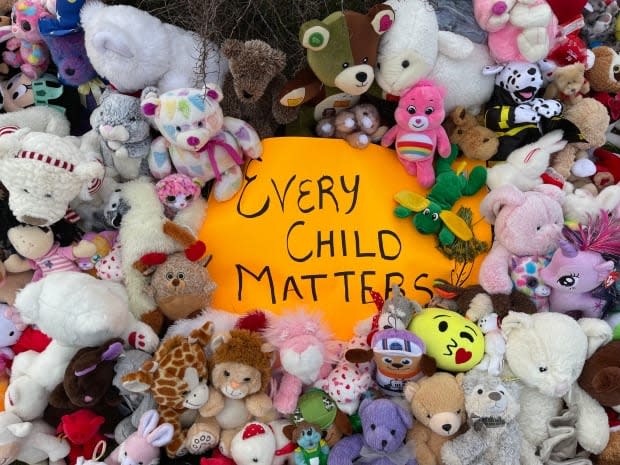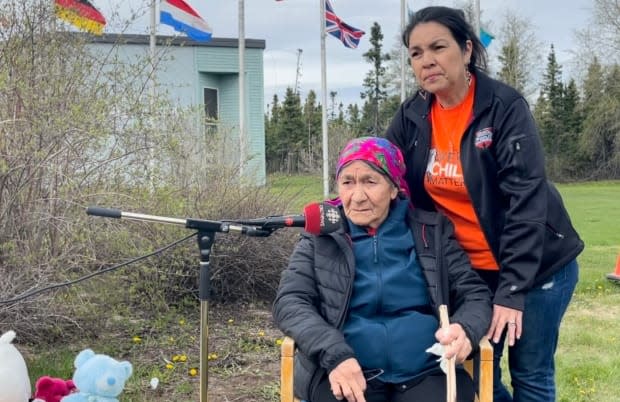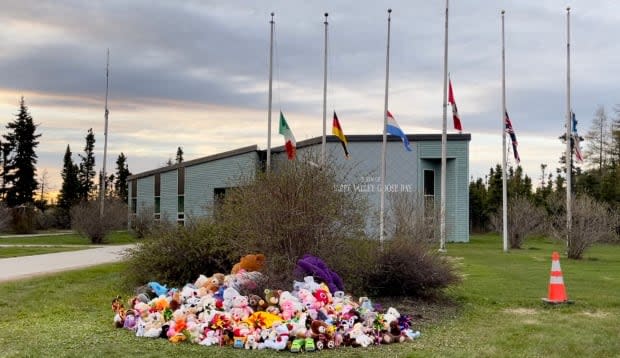'It hit close to home': Labrador memorials grieve for Kamloops residential school victims

WARNING: This story contains distressing details
Grief, consolation and keepsakes of childhood marked a gathering of dozens of people in Happy Valley-Goose Bay on Monday to remember the lives of the lost children at a former residential school in Kamloops, B.C., as just one of the ways Indigenous people in Labrador are coming together to cope with the tragedy.
"It hit close to home," event co-organizer Jodie Ashini said of the news last Thursday that the remains of as many as 215 children had been found at the Kamloops Indian Residential School, according to a survey by the Tk'emlúps te Secwépemc First Nation.
Ashini, a member of Sheshatshiu Innu First Nation, knows the overwhelming pain of losing a child with the death of her daughter at the age of seven.
"I was privileged enough to bury her and have that closure," Ashini said.
"And to step in their shoes and never have that closure, never be able to bury your child or say goodbye … I can't imagine that feeling. That was one of my biggest, biggest heartaches."
Ashini turned that heartbreak into action and, along with Thea Penashue, posted a call on social media early Monday for people to gather outside the town hall. Two and a half hours later, dozens of cars lined the road, and a tribute began to form: teddy bears heaped upon each other, their plush smiles surrounding an orange sign reading 'every child matters.'

Penashue had her young daughter in tow at the event.
"I was thinking about the abuse the kids had to go through. And the parents, what they had to go through, getting their kids taken away from them, because I can't imagine how it would feel for my kids to be taken away from me," Penashue told CBC News.
Innu Elder Elizabeth Penashue addressed the crowd, and afterward told CBC News of the importance of discussing residential schools in order for healing to follow.
"If we don't talk, she said, no one's gonna hear us. That's why we need to keep talking about it, and the government needs to hear, hear what's happening to our people," said her daughter, Kanani Davis, translating for her mother.
Our kids are being sent away, just like our parents [were] sent away. - Jenny Oliver
More than 150,000 First Nations, Métis and Inuit children were placed in residential schools between the 1870s and 1996.
Four schools operated in Labrador and one in Newfoundland, although they were not recognized in the report of the Truth and Reconciliation Commission because they had opened before Confederation with Canada in 1949.
'History is not gone'
At Monday's commemoration, Sheshatshiu Innu First Nation Chief Eugene Hart highlighted the continued wait for an inquiry into Innu children in the Newfoundland and Labrador child care system.
"History's not gone," he said.

That inquiry was promised by the provincial government more than three years ago.
"It's a long, long process. That's why it's important to voice, from each community, who you represent. To bring out your concerns and speak out," Hart said.
"Because if you don't speak out, it's not going to get anywhere."
Monday's turnout sends a strong message, Hart said, and helped continue an Innu tradition of coping.
"When there's a tragedy or death in the community, the community mourns together, and that's how you move on in life," he said.
On Labrador's north coast, in Nunatsiavut, an Inuit elder in Nain echoed the sense of history repeating itself through the current child care system.
"Our kids are being sent away, just like our parents were sent away. And there's so much money put into sending our kids away — the services, the foster parents, all of those resources outside our communities," Jenny Oliver said.
Oliver said she hopes the Kamloops tragedy provokes action to end current child care system practices, and boost Inuit self-determination and advocacy.
"We have more power as community members than anyone realizes," she said.
Nain memorial planned
Both Oliver's parents were forced to attend residential schools, she said, and as she processed the news of from Kamloops she felt spurred to support local survivors.
While some memorials elsewhere in Canada have featured children's sneakers, Oliver said she felt gathering together 215 pairs of children's traditional Inuit footwear, or other items like mittens, would be more appropriate in Nain.
"I wanted to honour them in our own way, in our own cultural way," she said.

Oliver is planning to place the clothing by the former residential school in Nain, and hold a quiet memorial where survivors could be able to reflect.
"Not in a formal setting, but in a way that they can all be together and have our own community be there for them, and to hold something that is very special to them," Oliver said.
"I think our own healing and way of healing is being together on the land, with each other."
Support is available for anyone affected by their experience at residential schools, and those who are triggered by the latest reports.
A national Indian Residential School Crisis Line has been set up to provide support for former students and those affected. People can access emotional and crisis referral services by calling the 24-hour national crisis line: 1-866-925-4419.

